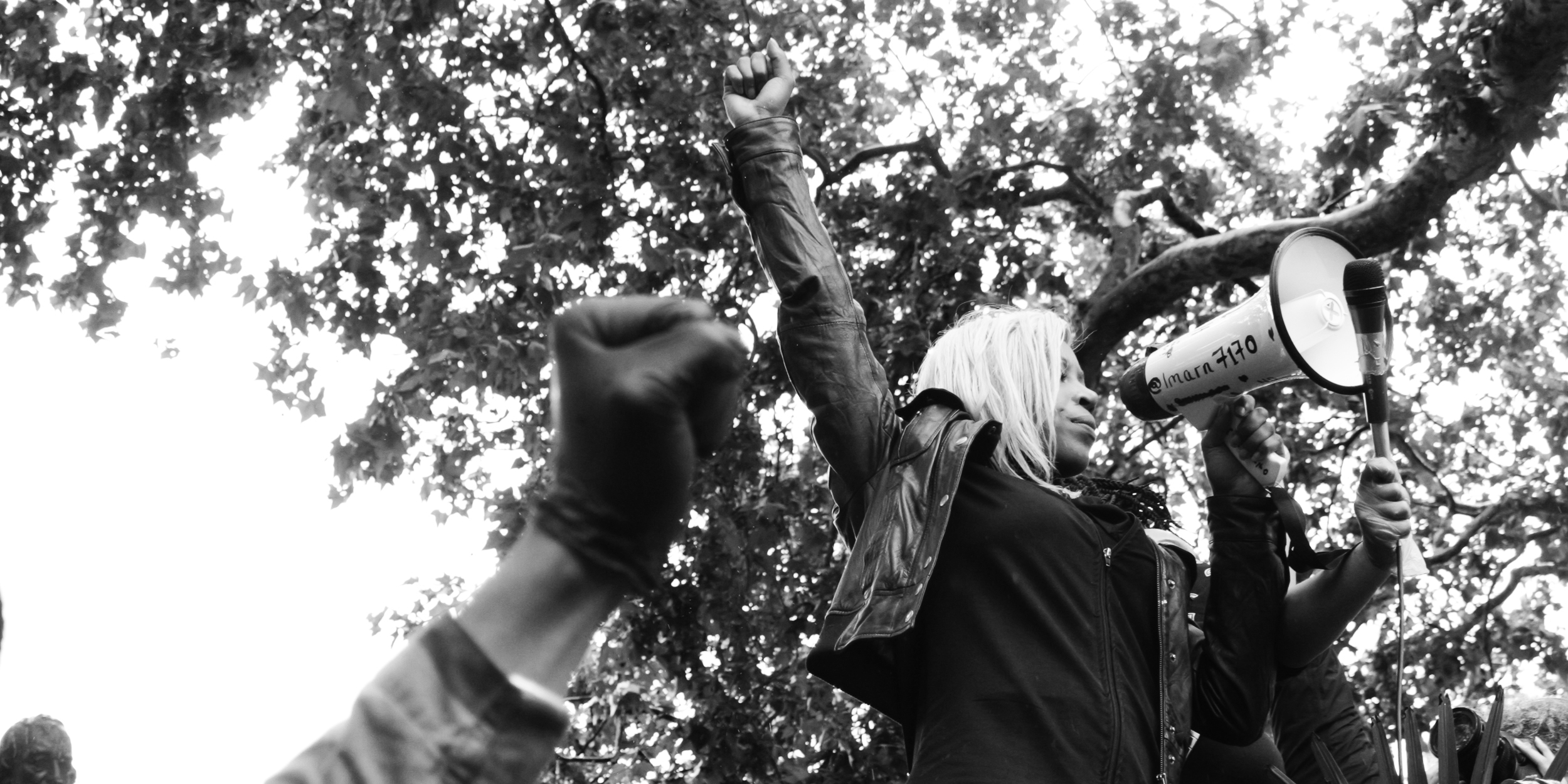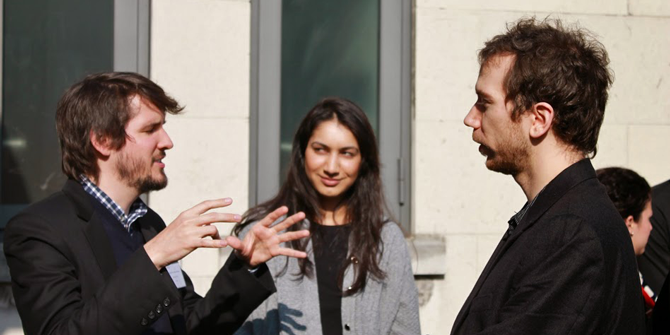As the world watches one of the most extraordinary electoral contests in US history unfold our US students give their reaction and analysis.
 “We must continue to demand an America built to support us all”
“We must continue to demand an America built to support us all”
Four years ago, Harry Belafonte wrote a piece asking what America, in particular its black people, had to lose. Belafonte answered, “everything.” Throughout Trump’s entire presidency, but especially in 2020, we have learned how true this was.
We are not a post-racial society and racism is a systemic problem. White supremacist, “All Lives Matter” rhetoric and violence is the problem. We, white people, must acknowledge our role in racism, and then deal with it and fight against it.
So where do we go from here? Both sides viewed this election as a referendum on good and evil. With Biden at the helm, perhaps the country will be led into a process of justice and reconciliation. With Trump at the helm, these next four more years promise to be even more divisive than the past four.
Now we need to hold conversations. Exit polls are showing 55% of white women voted for Trump. Their support for him grew over the last four years. Roughly three out of five white voters voted for Trump. I, like many others, hoped the election would play out differently. I hoped for big margins. In those margins rested acknowledgement of the wrongs committed by this administration and the complicity of its supporters. For the 235,000 Covid-19 deaths. For the lynching of Ahmaud Arbery. For the murder of Breonna Taylor. For those who must carry on after this election after 70 million people around them voted for a man that does not value their right to life.
In the coming weeks, I will work to understand what I cannot. As a white woman, I have been afforded many things. I am privileged to have is the ability to question and demand without fear of dire consequence. This system is not built to hurt me. But I am not afraid for myself. I am afraid for the people who have been told over and over again that this system, this government, this country is not made for them. That’s who I vote and shout and fight for. We must continue to demand an America built to support us all.
Paige Anderholm is an MSc Conflict Studies student in the LSE Department of Government and voted in North Carolina. Her research interests focus on post-9/11 terrorism in the United States, specifically far-right and white supremacist motivated violence.
 “An election is just a checkpoint on a long road of progress”
“An election is just a checkpoint on a long road of progress”
At 10am on election day a group of young people on the Navajo Reservation in northeast Arizona rode together on horseback through the red sand desert to the voting booths in a small primary school to add their voices in the biggest American election in a century. Their parents just over fifty years ago still didn’t have a guaranteed right to vote, but Allie Young, a 30-year-old Navajo woman, organized several young people get to the polls in a state that may ultimately clinch the election for the President of the United States.
The pundits have spent the last 72 hours (or 72 years, hard to tell) talking about how this election gives Biden (if elected) a weak mandate to govern. But one demographic sent a clear message. Nearly two thirds (61%) of voters under 29 pulled the lever for the Biden-Harris ticket, a higher percentage than Clinton’s 55% in 2016. They voted for a different vision, an anti-Trump vision.
Young people also came out fighting for their rights and their lives this year. We saw it in the streets of Minneapolis, just as we saw it in the streets of Hong Kong, of Warsaw, of Minsk, of Lagos, of Bangkok, and many, many more. Young people stood with phones and umbrellas in front of batons, rubber bullets, chemical weapons, and, in some cases, live ammunition because they knew standing on those streets was better than sitting on the sidelines. While the overall results of this election weren’t everything some people hoped for, we know an election is just a checkpoint on a long road of progress and in the days, weeks, and months ahead, we will see millions of young people across the world organizing across race, nationality, and borders and continuing their fight for a fairer future.
Ben Grazda is pursuing a MSc in Conflict Studies in the LSE Department of Government. He spent the last four years working for humanitarian organisations in the Middle East and sub-Saharan Africa, and before that he worked at the United States Senate for three years.
 “The people maintain the power to affect change”
“The people maintain the power to affect change”
This summer protestors filled the streets of cities and towns across the United States in response to the murder of George Floyd. Those protests have grown into a movement that demands a fundamental reimagining of police and public safety. The results of this week’s election show that the work to radically change the criminal legal system will be in local communities – not the halls of Congress or the White House.
This is evident in a range of ballot initiatives from across the country. Oregon became the first state in modern history to decriminalize all drugs, including small quantities of heroin and cocaine. This result was among a wave of Americans in blue and red states who repudiated the policies of the war on drugs.
Californians rejected the legislature’s plan to replace cash bail with an algorithm-driven risk assessment tool and voted to restore voting rights for adults who are not in prison. In Columbus Ohio, voters approved a measure to implement a civilian police oversight board. Voters in cities from Los Angeles to Philadelphia mandated the release of body-worn cameras and redirected police funding toward community initiatives.
Ballot initiatives are important because they allow voters to take issues into their own hands. In a system where direct democracy is largely absent, their success demonstrates the central role community organizers and grass-roots campaigns play in addressing the issues that neither the party is willing to tackle. As we wait for the final electoral votes to determine the presidency, these initiatives are a good reminder that the people maintain the power to affect change.
Ellie Olsen is a student in MSc in Conflict Studies in the LSE Department of Government where she focuses on post-conflict justice and reconciliation. Before joining the LSE, she was a criminal defence investigator at the Public Defender Service in Washington, D.C.
 “This election illustrates that Trump’s popularity surpasses stereotypes”
“This election illustrates that Trump’s popularity surpasses stereotypes”
Regardless of who ultimately wins this presidential election, President Trump’s supporters represent a massive threat to democracy that critics would rather caricaturize than confront. J.D. Vance’s wildly popular 2016 memoir, “Hillbilly Elegy,” offered a compassionate look into the Rust Belt’s poor whites, their systematic abandonment, and subsequent enthusiasm for Trump. However, popular media has simplified and exploited this narrative to caricaturize Trump’s supporters as universally poor, white, and uneducated. This is exemplified by Jordan Klepper’s segments for the Daily Show that mock Trump’s supporters by framing them as entirely clueless, crude, and hypocritical. Although humorous, this characterization dangerously misunderstands and ignores broader support for Trump and its implications.
This election illustrates that Trump’s popularity surpasses stereotypes. Results show that while former Vice President Biden won 53% of low-income votes, Trump received considerable support from minorities and college educated voters, winning 8% of Black votes, 35% of Latinx or Hispanic votes, and 42% of college educated votes. These are significant gains from 2016, where he won only 6% of Black votes, 28% of Latinx or Hispanic votes, and 29% of college educated votes. I do not deny that a broad spectrum of Trump’s appeal hinges on his racism, homophobia, and sexism. However, I offer the above evidence as a warning: Trump has brought out a deep dissatisfaction with a globalizing and liberalizing United States while also encouraging an intense mistrust of its institutions and politicians. His supporters are already echoing his claims of election fraud, and the Republican Party’s inability to distance itself from Trump’s beliefs in order to court voters complicates the future of bipartisanship. If elected, Biden must attempt to heal these divisions, and I believe the first step is to stop the caricaturizing of Trump’s supporters that further entrench them in an anti-establishment, victim mentality.
Mary Angela Ricotta is a student in MSc Conflict Studies in the LSE Department of Government and graduated from Kenyon College in the US in 2020 with a degree in Political Science. Her research focuses include literature of the Middle East and North Africa, humanitarian work in relation to refugees, and international human rights law.
Note: this article gives the views of the authors, and not the position of the LSE Department of Government, nor of the London School of Economics.





